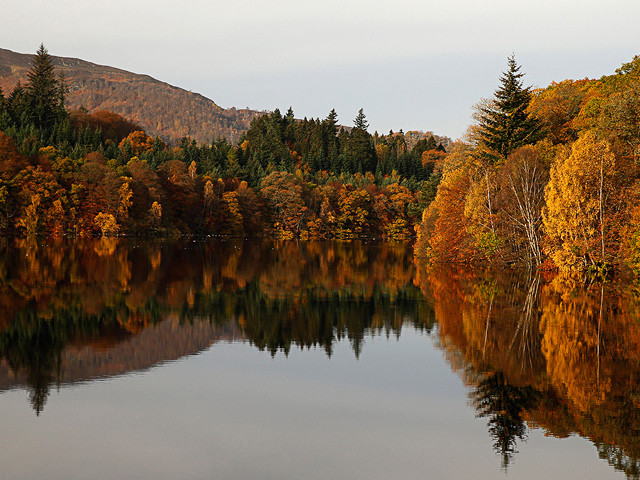Not long ago Rustam, piping melancholy notes on a bamboo flute, had netted moonbeams in a fishnet. To his astonishment, began flickering on the boat sails white Devi’s image. His quest, life-long, perhaps encompassing his previous lives, was manifesting before him – in shadows and in flickering phantoms.
“The clairvoyant woman was right,” thought Rustam.
On one of his long voyages, as Rustam moved from river-to-river, singing banjara (nomad) songs with pakhi-baz, and as he listened to their lisping tales, he met an old woman, with bent back, who in a crooked copper pot, collected fallen leaves, and read on the crusty leaves, the destinies of the curious and desperate.
“Inside brown autumn leaves, as end three seasons, inscribed are fates,” said the leaf woman.
The leaves, fallen or hanging from the branches, brown or green, conical or flat, perfumed or unscented, carry within their veins, imprints of time, its moving whirls, as the past is grooved into present and the present is embedded into future, and the future digs into past, and the leaves feeling all concentric movements, become privy to all whispers of time.
And Rustam, searching for eternal love that perhaps like a rainbow, which had split into seven dispersed colours, but never forgot it’s essence as a white sunray, was standing over his previous and the coming lives like a penumbra.
Near banks of a river, which flowed from a snow-covered peak, towering to the sky like a jewel, he went to the hut of the old woman, and touched her feet.
“Love… love… unseen… but felt deeply in heart. Why is it hiding from me?” asked Rustam.
The clairvoyant woman, with dark plaited hair, falling on the ground, twirled her finger around the pot, smelling the decaying aroma of leaves, and mouthed out inaudible vowels. The droning of yellow wasp, loitering around paper-thin nests, drowned her voice, and the boy’s ears could hear only whizzing flights of yellow insects.
“Close your eyes, fold hands around chest, and imagine you are floating on a bark in a sea,” said the woman.
“Now imagine silvery flute sounds from the shore wafting and dancing over sea waters. Can you describe bits of melody?”
Rustam, his eyes pinched into darkness, said,
“The wind, unbroken wind, is assailing me from all sides, tossing and turning my bark raft, and the melodies are submerged into the windy squalls, but on the sea waves are dancing sea lions, rise they upwards and fall again into the deep waters, leaving me drenched with spume. But no melodies ring around my ears.”
“What is the colour of spume?”
“White! Must be white…sea foam is always white.”
The old woman, scratching a tiny black wart on her chin, opened the window of her hut, and stood under the slanting sunrays, white motes swam around her wrinkled face, in untethered light.
“Open your eyes and look at whirl of motes; they appear white in the streaming sunlight; if I close the window, the motes will become invisible. Foam is not white – it is colourless. All colours are born out of illusions. There is no reality like unseen love. If love ever swamped your heart, even for a few moments, it touched with all colours.”
And the boy, squinting his eyes in the sunlight, and before he could utter a word, protested at her command – like commandments, was asked to leave the hut,
“Become a real banjara – not of foot alone, and find in the wanderings of heart the invisible fate. And as you have come from afar, drifting here and there, spurred by the wafting wind, I can unveil to you, a teeny bit of your fate, that in the sangam (confluence) of three rivers, amidst the silent strains of Bageshree raga, your love might hum strains.”
Since Rustam heard the woman’s words, the boy played the flute upon the sangam of river waters in the middle of night, straining his ears to Bageshree raga, and on some moonless night, when resting boats didn’t glimmer, he could hear women singing on shores. But voices did not leave shadows, or did they? Sometimes the melancholic strains seemed to caresses river waters, dancing like fireflies on its dark waters. But as he waded into waters, fireflies were the shadows thrown by city lights.
And Rustam became a banjara, began living and moving with pakhi-baz, who pitched bright patch-worked tents, with iron poles jutting out of the tents, near water bodies and green fields. With nothing to move on the arduous journeys, apart from a few charpoys, tin utensils, and some animals – goats, donkeys, and dogs – they migrated with ease, as uprooted seaweed float on waves. With rootlessness seeped into their consciousness, their companion was also a dispossessed god, and wherever they went, they built shrines in their god’s honour.
Rustam learnt to sing, dance, and narrate stories from them. On long winter nights, they circled around burning logs, and when the pakhi-baz women lit earthen stoves, the aroma of freshly-baked bread wafted to him; and as he dipped soft bread into the spicy curry, into his heart weaved pakhi-baz men stories of rivers, lovers, wars, and white goddess.
When rain pounded the tent, and rattled the iron poles and buckets, Rustam’s lost dreams floated around him like pieces of jigsaw puzzles or tasteless and invisible sting of the empty wasp nests.
“Was dancing Devi real? Or just an image? Nothing more,” thought Rustam.
Once, an old pakhi-baz, near a silent stream, strained his ears as if trying to listen to distant voices, coming from across the stream bank.
“Strived I have in vain to hear melodies born in the bosom of rivers, whenever muddy waves lap in rivers, I row across the river, but never could I translate their murmurings into words, into meanings…” said Rustam.
The old pakhi-baz combed his long, floss-white beard with hands, an affectionate smile played upon his face, and spreading his frayed headdress on the reeds, he took out a flute from his shirt pocket, and began playing a mournful song. The musical sounds mingled with the summer breeze, blowing over the reeds, and herons, standing still in stream waters, picked up the melody. With beaks submerged in the clear blue waters, eyes fixed on the swimming fish, songs slipped from white wings and meshed with the sunrays dancing on waters. And the silent stream waters, awakened by the buoyant melodic notes, opened heart, pouring out soft murmurings, like the sound of rainwater, falling over stone slabs.
“Listen now!” said the old pakhi-baz.
“Sohni swam across my tides with a clay pot. And one day, she sank into the dark depths with the melting of clay pot,” sang stream. “But she is alive and you can hear her wails in the songs of white reeds.”
“Not that she is always lamenting. Not that she screams for end of her and Mahiwal’s drowning into my bosom.”
“Sometimes, she sits on the shores as mermaid and she plays hide and seek with kids. They can’t see her, but feel her as gentle breeze on their faces. If you become child at heart, she will come and sit with you.”
To search singing mermaids, Rustam moved to another river, flowing through human borders. Now, bounded, shackled. Once free. Now like an old man, blinking in the glared sun, the river waited for the death. He felt its presence close to his heart, which covered his shrivelling, sinking self.
“Where are your sun-mellowed waters?” asked Rustam.
And the river was always quiet, as if gone deaf with old age, and as passed a few months, he met an old man under the tree of speech. Never the old man uttered a word, but the flute melodies, played by him, danced in the reed grove, gladness pouring out of them. After months of listening to the old man’s songs, and living inside the meanderings of his silent tongue, the boy started conversing with river. On an overcast day, with dark, gloomy skies merging with its waters, suddenly, river confided to the boy:
“Killings follow me like a nightmare.”
“Do you see nightmares?"
“Yes!”
“Just like you and these herons on my banks; ghouls arise from my bosom, chanting waheguru....Nabi nabi.....gopala...One ghoul merges into another and incarnates into another shape.”
“Do ghouls also incarnate?” asked Rustam
“Not only ghouls incarnate, they take different forms,” said the river.
Opening his heart to Rustam, river narrated to him the tales of baby heads bobbing in the sanguine waters, eyes gone white under the blazing sun, the festering weeds entwined with floating breasts that suckled hatred.
“On my banks, once beautiful women rubbed mud on their bodies, turning them into lustrous lotus flowers. Now my banks are stained with blood, and buzzards circle over them, where once egrets and pigeons spread their glad wings and fireflies beeped light under the ancient trees.”



COMMENTS
Comments are moderated and generally will be posted if they are on-topic and not abusive.
For more information, please see our Comments FAQ